However, a new report published by the Royal Agricultural Society of England (RASE), which details a four-year study carried out on the Game & Wildlife Conservation Trust’s Allerton Project research farm in Leicestershire offers renewed hope about crop production in the future. It explains how an holistic approach to crop production has achieved an eight per cent increase in yields over a conventionally managed area as well as seeing an 8-12 per cent reduction in fertiliser use across the rotation.
Dr Alastair Leake, policy director of the GWCT’s Allerton Project explains the ground-breaking nature of the study, “The demand to produce food for a growing world population has placed more pressure to increase crop yields. But our soil, like anything else, is a living organism, which we take for granted at our peril. For the first time, we are taking a completely new look at soil to harness its natural biological functions to release and boost the existing nutrients within the soil itself. Although this process is not very well understood, careful exploitation could provide a means of improving crop output whilst reducing nutrient inputs and costs.”
The RASE report explains how it is vitally important to maintain the healthy condition of soil in order to improve crop production. Despite advances in seed breeding, crop protection and precision farming, yields over the last 15 years have hardly improved on many farms. This is leading to concern about deteriorating soil condition, water quality and the cost of being over reliant on chemically based systems. Applying more fertiliser, particularly nitrogen, can accentuate the imbalances, increasing stress in the plant and adding to disease pressure.
This field scale study reported in the RASE journal was a collaboration between the Royal Agricultural Society of England (RASE under the AH Hills Bequest), the Glenside Group and the GWCT’s Allerton project research farm.
The four-year study investigated two growing systems. One was a conventional nutrient management system and one using Bioscence® – developed from Glenside’s comprehensive soil test based on Albrecht® principles. The Bioscence® approach combines a wider and more targeted range of nutrients in conjunction with biological inputs such as bacteria and fungi, which naturally occur in the soil. In essence, the system provides detailed background information about each field, enabling farmers to identify the key factors – chemical, physical and biological which are missing from the soil and are thus limiting crop yields and quality.
Dr Leake explains, “This novel ‘Bioscence®’ approach has, until now, not been well understood but this new tactic shows promise and will be good news for British food production.
It certainly takes the way we view and manage soils to a new level. Once the right aspects of the soil have been analysed, farmers can utilise a range of technologies including changes in tillage techniques, nitrogen enhancement, applications of bio-stimulants and active biological cultures to boost the natural productivity of the soil.”
David Gardner, Chief Executive of RASE said, “We are very impressed with the RASE sponsored work that was done at the GWCT’s Allerton Project. It clearly demonstrates the complex nature of crop nutrition and soil biology. But the results so far show that there are huge opportunities to further explore this subject for the benefit of better yields and environmental protection. We hope that this study will trigger further research on both Glenside’s Albrecht® Soil Survey system and the opportunities associated with influencing soil biota.”




